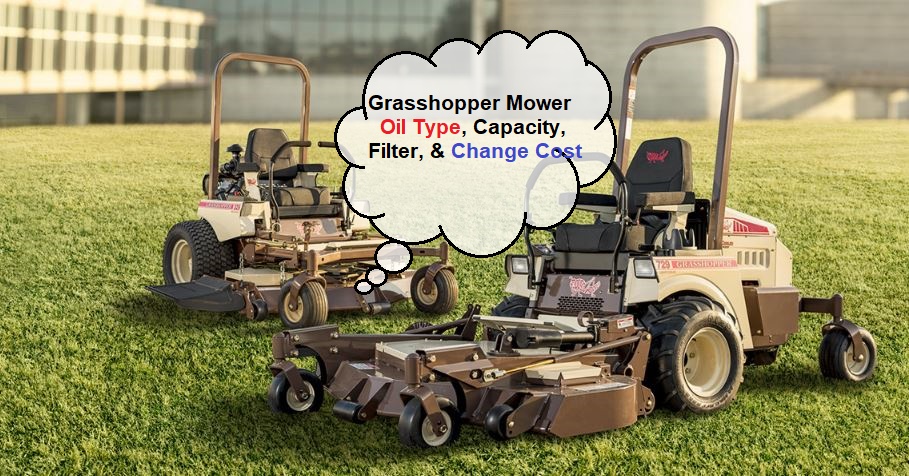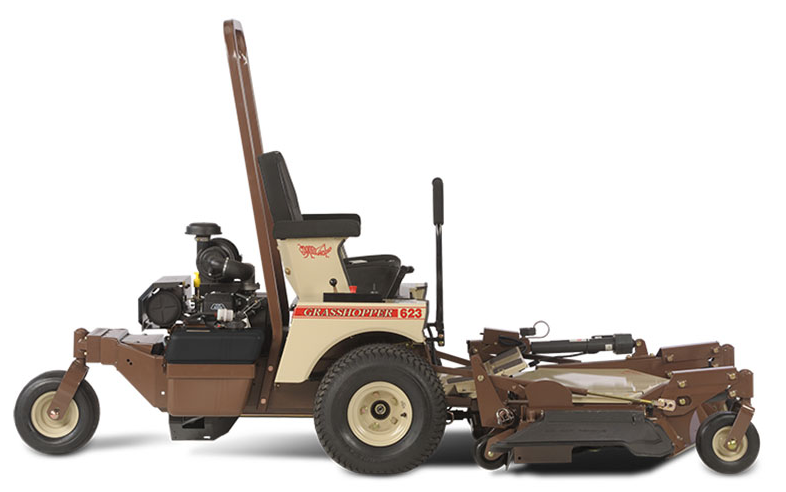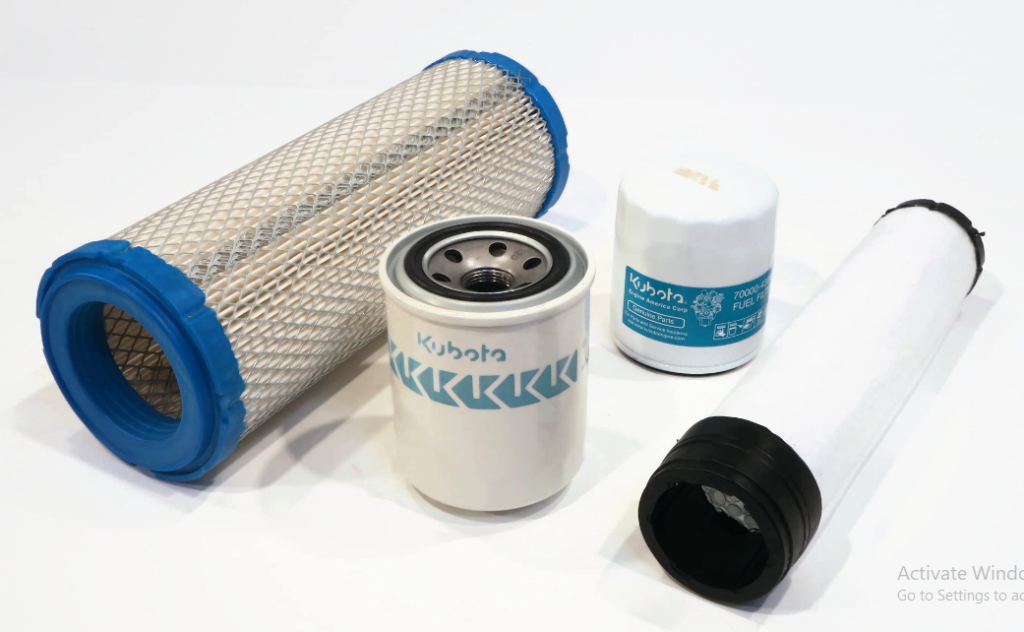Grasshopper Mower Type of Oil: Maintaining your SCAG mower cutting through the grass like a champion is a constant process of maintenance And oil changes are an essential element of.
However, with A variety of kinds of engines, capacities for oil And filters As well As the cost of changing them And considering, the process may seem like fighting an unruly forest.
This guide, taken directly from SCAG’s official SCAG sources, provides you with the most up-to-date information about oil changes provided in A simple, easy-to-read table format, so you can take on the lawn confidently.
Grasshopper Mower Oil Type, Capacity, Filter, & Change Cost
Model Year | Engine Type | Oil Type | Capacity (Quarts) | Filter Part Number | Recommended Change Interval | Approximate Change Cost |
|---|---|---|---|---|---|---|
2024 & Newer | Kawasaki FS Series | Kawasaki Genuine 10W-30 Synthetic Oil | 2.4 | FS481V-10921 | 50 Hours or Annually | $20-$30 |
2024 & Newer | Briggs & Stratton Vanguard EFI | Briggs & Stratton Synthetic 5W-30 Oil | 1.9 | 31233 | 100 Hours or Annually | $15-$25 |
2023 & Older | Briggs & Stratton Vanguard | Briggs & Stratton SAE 30 Oil | 1.9 | 61343 | 50 Hours or Annually | $10-$20 |
2023 & Older | Kohler Command | Kohler Command Pro 4 Cycle Oil | 1.7 | 19 083 02-S | 25 Hours or Annually | $15-$25 |

Grasshopper Mower Oil Type
The best oil for the Grasshopper mower is a premium synthetic SAE 30 or 10W-30 oil. Synthetic oil offers better protection for your engine across higher temperatures than traditional oil. It’s additionally less likely to degrade in time, which means you will have longer intervals between oil replacements.
Here are some oil suggestions from Grasshopper:
- Briggs & Stratton Vanguard engines: SAE10W-30 blend synthetic oil
- Kohler Command engines: SAE 10W-30 Synthetic Blend oil
- Kubota engines: SAE 10W-30 synthetic blend oil
It is crucial to consult your owner’s manual to find the specific oil specifications for the model of your Grasshopper lawnmower model.
Grasshopper Mower Oil Capacity
The capacity of oil in the Grasshopper mower is dependent on what model it is and the size of the engine. Here’s a table listing capacities for oil in some of the most well-known Grasshopper mowers:
Model | Engine | Oil Capacity (Quarts) |
|---|---|---|
120 | Briggs & Stratton Vanguard 614 | 1.75 |
124 | Briggs & Stratton Vanguard 616 | 1.75 |
120K | Kohler Command 718K | 2 |
124K | Kohler Command 718KH2 | 2 |
220 | Kohler Command 220 | 2 |
225 | Kohler Command Pro 225 | 2 |
227 | Kohler Command Pro 227 | 2 |
325 | Kubota WG752 | 3.4 |
329 | Kubota WG972 | 3.6 |
432 | Kubota WG972 | 3.6 |

Grasshopper Mower Oil filter
Grasshopper mowers utilize different types kinds of filters for oil, based on the model and the engine. The most popular type of oil filter that is used on Grasshopper mowers is a spin-on filter. Spin-on filters are simple to replace and can be found in most garden and lawn shops.
To determine the right oil filter to fit your Grasshopper mower, check the owner’s manual or call Grasshopper support. You can also search for the oil filter’s part number using the model’s number. Grasshopper website.
Here are some of the most common Grasshopper mower parts numbers for the oil filter:
- 100803: For Kohler engines
- 100860 for FrontMount G2/G3 series transmission
- 100855 The MidMount Series comprises 100, 200, 300 400 Series as well as the FrontMount H2 Series (718KH2 721DH2,) and 928D Gemini mowers
When you are changing your Grasshopper mower’s oil filter make sure you are using the proper type of oil filter and the appropriate quantity of oil. Refer to the manual of your owner for further details.
grasshopper mower oil change kit

If you are seeking replacement kits for the oil in your Grasshopper mower There are various options available. Here are some kits that come with filters and oil:
- Tune-Up Kits and Engine Parts for Grasshopper Mowers: This site offers a kit for changing the oil on Grasshopper mowers. They include Kohler filters and oil change kits along with tune-up kit kits.
- New Service Kit for Grasshopper 22 hp, 25 hp, and Diesel Engines Air Fuel Filters for Oil: The kit contains air, oil, as well as fuel filtering for Grasshopper mowers that have 22 or 25-horsepower diesel engines.
- Service Maintenance KIT Grasshopper 725D 725DT 725DT6 Air Oil Fuel Filters: Kit includes oil, air, and fuel filtering for Grasshopper mowers equipped with 725D, 725DT, or 725DT6 engines.
- engine maintenance filter service Kit is compatible with Grasshopper 722D, 722D2, and 725D mowers: This kit contains an air filter on the outside as well as an inner air filter fuel filter, as well as an engine oil filter. This kit is for Grasshopper mowers that have 722D 7, 722D2, and 725D engines.
You can also refer to the Grasshopper mower’s manual to get all service information, including the number of oil filters ordered and the engine oil capacity. Furthermore, some Grasshopper filter oil can be purchased at Walmart.
Grasshopper Mower Reviews
Grasshopper mowers are renowned for their superior quality, durability, and maneuverability, making them A favored choice among both professional landscapers And homeowners with expansive lawns. Here’s an overview of the advantages and disadvantages as perceived by users:
Pros:
- Excellent Cut: Grasshopper mowers are highly praised for delivering a clean, even cut, even in tall grass.
- Durable Construction: Built with robust frames and heavy-duty components, Grasshopper mowers are designed to withstand rigorous use over time.
- Comfortable Ride: Featuring an independent suspension system, Grasshopper mowers offer a smooth and comfortable ride, even on uneven terrain.
- Easy Maneuverability: Thanks to their zero-turn design, Grasshopper mowers are exceptionally maneuverable, allowing for easy navigation around obstacles.
- Front-Mounted Deck: The front-mounted deck enhances visibility and facilitates easier trimming around landscaping features.
Cons:
- Higher Price Tag: Grasshopper mowers tend to come with a higher price compared to many other mower brands.
- Complex Controls: Some users find the controls on Grasshopper mowers to be complex and may require a learning curve.
- Less Effective Clipping Dispersion: In certain conditions, such as wet grass, Grasshopper mowers may not disperse clippings as effectively as other brands according to user feedback.
grasshopper mower oil change
To change the oil inside your Grasshopper mower take these steps:
- Start the engine by running it for a couple of minutes.
- Switch off the engine and remove that spark plug cable to prevent accidental ignition.
- Install an oil drain pan beneath the mower’s drain plug.
- Unplug the drain plug from the oil and let the oil drain completely.
- Replace the plug that drains oil and secure it.
- Clean the oil filter, then get rid of it correctly.
- Install a fresh oil filter, then tighten it by the manufacturer’s directions.
- Fill the engine up with the recommended type and quantity, taking care not to overfill.
- Connect the spark plug wire, then begin the engine.
- Verify the level of oil by using the dipstick. Add additional oil if needed.
- Get rid of the old filter and oil correctly at a recycling center or an auto repair shop.
You should change your oil on the Grasshopper mower at least every 100 hours of operation, or at the very least every season. Always refer to the operator’s manual for detailed instructions and maintenance schedules recommended by the manufacturer.
People Also search for grasshopper mower oil-type
| grasshopper 725d oil capacity |
| grasshopper hydro-max fluid equivalent |
| grasshopper 725d oil type |
| grasshopper hydraulic oil substitute |
| oil for grasshopper mower |
| grasshopper 721d oil capacity |
| grasshopper 725d oil change |
| grasshopper 729 oil type |
| grasshopper 729 oil capacity |
| grasshopper 325d oil capacity |
| grasshopper 721d hydraulic fluid capacity |
| grasshopper hydraulic fluid change |
| grasshopper 325d oil change |
Final Word
The type of oil you apply to your Grasshopper mower will be determined based on the model you’re using. Always consult your manual proprietor and Grasshopper Customer Service to find the kind of oil that is recommended on your lawn mower.
In general, Grasshopper mowers need 10W-30 or 10W-40 motor oils. However, it is essential to verify the specifications that are specific to the model you’re using to ensure maximum performance and long-lasting.
Be aware that not applying the correct type of oil or ignoring regular oil changes can cause damage or wear and tear on the mower’s engine. Therefore, it is crucial to follow the instructions of the manufacturer’s specifications for the kind of oil to use and maintain.
For more posts visit our website: https://engineoiil-capacity.com/
FAQs – Grasshopper mower oil type
What kind of fluid do you put in a Grasshopper mower?
Replace with OEM-specified filter, and refill with OEM-specified fluid only. Transmission fluid change intervals for Grasshopper mowers range from 300 to 1,000 hours with specially formulated CoolTemp Hydro-Max™ fluid. Thoroughly clean all grease fittings and lubricate with SAE multi-purpose grease.
How do I take care of my Grasshopper?
Practicing regular maintenance will extend the life of your Grasshopper and keep it in optimal working order. Simply follow these simple steps: Always check the engine oil before starting the mower. Change the oil at recommended intervals using the proper grade of oil, and always use OEM filters.
What kind of hydraulic fluid do I use in a Grasshopper 721?
What type of hydraulic fluid should I need to use on the Grasshopper 721 model from 1998 that has Kubota engines? The Hydros need Grasshopper Fluid which is also called Mobil DTE 26. Without a guideline, I’m going to guess that it requires ISO68. the oil that is labeled as DTE 26 AW ISO 68 ISO 68
What kind of oil does a Grasshopper mower use?
Recommendations for Viscosity for Liquid-Cooled Models: Check the engine oil level on a daily basis. greater than 7oF (25o C) 32o (0o C) to 77o F (25o C to 77o F) SAE 30, 10W-30, or 15W40 (25o) Below 32oF, use SAE 20, 10W40, or 15W40 (0o C) For cold or hot extreme operating temperatures, use SAE 10 or 10W30. Consult the engine manual for additional viscosity recommendations.